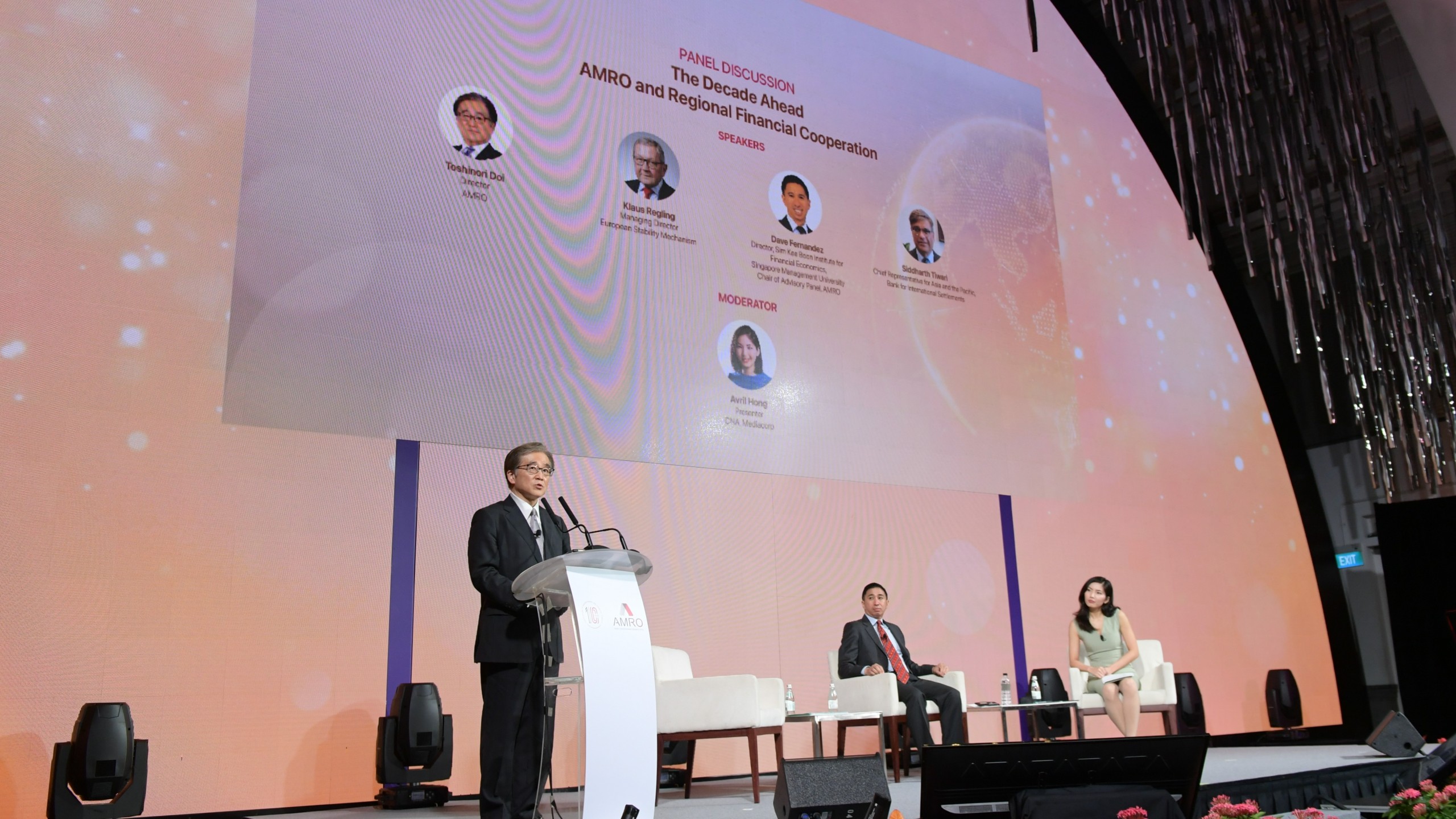
AMRO Director Toshinori Doi’s Keynote Speech on Next 10 Years of AMRO and Regional Financial Cooperation
December 7, 2021
Good evening.
It is my great pleasure to be speaking as Director of AMRO on its 10th anniversary, and to share my vision on the transformation of this promising institution over the next decade.
As you all know, ASEAN+3 is one of the world’s most dynamic and fastest-growing regions. And that will continue well into the next decade, with further increase in economic weight and level of economic integration. The shares of intra-regional exports and FDI stocks are at 47% and 67%, respectively. The region’s GDP share increased from 22% to 29% in the past two decades. And is likely to exceed one-third by 2030.
In the next 10 years:
The region’s share of voice in international discussion will increase with its growth momentum.
The region’s role in setting the global policy agenda will become more prominent, as ASEAN+3 policies will have a greater spillover effect across the world.
The region will have to shoulder more responsibilities to maintain its economic and financial stability through closer policy coordination.
Correspondingly, AMRO will also have to take on a bigger role.
Since joining AMRO in 2019, I have devoted to establishing the institution as a capable and trusted “family doctor”.
We stay close to our members, and make sure that their economic health is in good shape. If not, we will “diagnose” the symptoms, and standby to support the activation of the regional financial safety net. So far, that has not been necessary.
Going forward, to be able to deal with more complex and larger scale financial volatility, AMRO needs to be more than a family doctor.
First, AMRO should develop “specialist” capabilities in areas crucial to the region.
- We need to enhance our sectoral surveillance capacity and formulate institutional views on core issues, including capital flow management measures and macroprudential policy measures;
- We have to expand our research to cover emerging issues as well as long-term macro-structural issues, such as financial digital transformation, population aging, and climate change, to name a few.
Second, AMRO should provide a platform for its members to discuss economic and financial policies and serve as a regional thought leader.
As ASEAN+3 assumes more active role in global economic policymaking, AMRO, as the “regional knowledge hub”, will support its members by providing relevant analysis and ideas. Furthermore, AMRO may explore the opportunity of becoming the ASEAN+3 Secretariat for Finance Track, providing more institutional support to the process.
It is also important that we forge synergies with our partners to facilitate the formation of regional policies and cooperation agenda, and participate in various international fora to represent the “voice of the region”.
AMRO attended the ASEAN+3 Leaders’ Summit for the first time this year. Next year, we look forward to taking part in G20 discussions.
Third, AMRO should work towards strengthening the regional financial architecture. There are plenty of financing sources within the region, including multilateral and bilateral, long term and short term, concessional and non-concessional, often with limited coordination among them. AMRO, by constantly monitoring members’ external positions, can serve as a platform for members to take stock of the financing sources available, and play the role of a facilitator or coordinator during crises. In particular, AMRO should play a constructive role in establishing a stronger coordination between bilateral swap arrangements and the CMIM, creating a stronger regional financial safety net.
AMRO should also continue to strengthen its ties with the IMF and other regional financing arrangements such as the ESM, to make the global financial safety net even stronger.
Without a doubt, the CMIM will become more important to the region.
Upon my appointment as AMRO Director, one of my immediate priorities was to enhance the CMIM’s operational readiness. In the past 3 years, the CMIM Arrangement has seen several major upgrades. The IMF De-linked Portion has been increased to 40% with a streamlined and robust conditionality framework, a smooth collaboration mechanism with the IMF has been established, and the use of local currency institutionalized.
I am proud that the region’s financial safety net is now fully operational.
Moving forward, it has the potential to be more effective by catering to members’ changing needs. There could be many possibilities.
Allow me to offer three ideas.
- First, the CMIM may establish a special trust fund to extend concessional lending to assist low-income economies.
- Second, AMRO’s surveillance and CMIM functions can be integrated with the ASEAN+3 Co-chairs’ coordination functions to holistically and effectively oversee all aspects of CMIM activation.
- Thirdly, the CMIM Agreement could be upgraded into an international treaty to ensure better institutional governance.
AMRO at 10 years old may seem young compared to all its peers. Yet it has flourished to meet the needs of its members and the region in a short space of time.
It has been my privilege to lead AMRO during its adolescence. And I look forward to witnessing its development and growth in the years ahead.
I am confident that AMRO has great potential to serve as the custodian of ASEAN+3’s growth and stability in the next decade and beyond.
Thank you.
